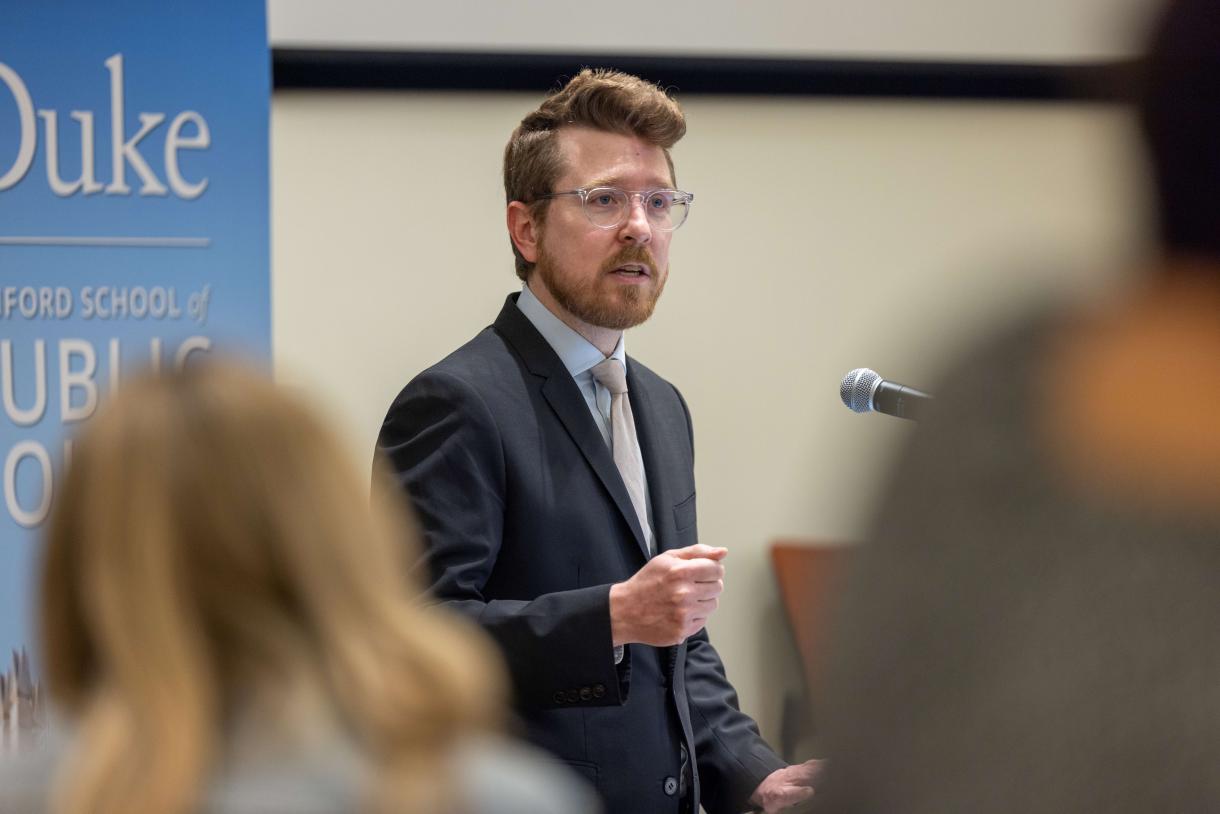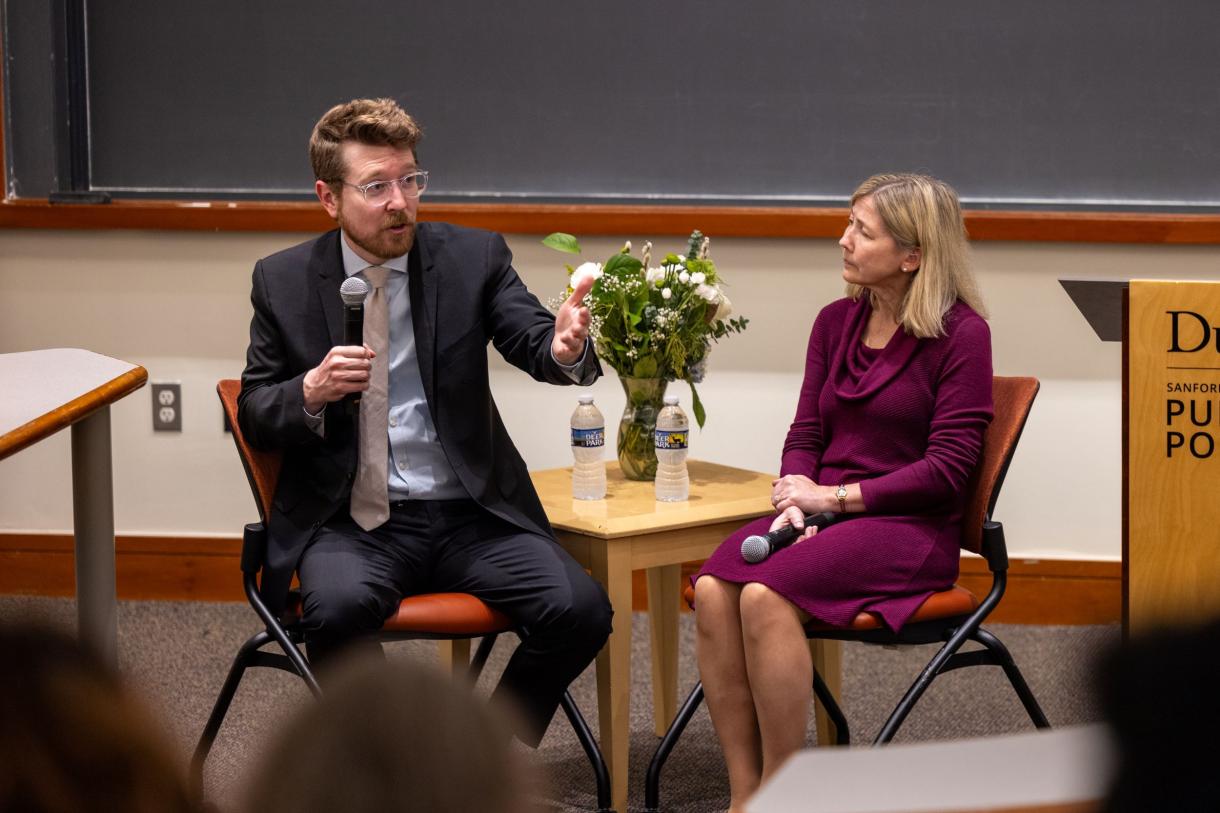
Adam Benforado, prominent legal scholar, author, and Drexel University professor known for his insightful explorations of the intersections between law, psychology, and society, spoke at Sanford Thursday as part of the Robert R. Wilson Distinguished Lecture Series. This series, which invites leading voices to highlight important conversations in public law, was co-sponsored by the Duke Sanford Center for Child & Family Policy (CCFP) as part of the center’s 25th anniversary celebration.
Benforado, known for his data-driven, logical, and persuasive distillation of big ideas, shared how prioritizing the best interests of children in all things: policy, law, and even economics, could radically change the way we develop the next generation and even prevent many of today’s biggest societal problems in coming years.

Currently a professor of law at the Drexel University Kline School of Law, he is also a New York Times best-selling author of A Minor Revolution: How Prioritizing Kids Benefits Us All and Unfair: The New Science of Criminal Injustice.
Building on his expertise from Unfair, Benforado released his second book, A Minor Revolution, in February. This book delves into the needs of children and the societal structures necessary for their healthy development. Through a compelling narrative, Benforado explores what children require to thrive and examines how society can create environments conducive to their well-being. Both offer profound insights into the workings of the legal system and the challenges of nurturing the next generation, reflecting his commitment to advancing justice and understanding in our society.
Meeting With Child and Family Policy Students

As his visit began, Benforado shared his insights and experiences in a smaller meeting attended by a mix of undergraduate and graduate students interested in law and policy solutions. Moderated by Jennifer Lansford, S. Malcolm Gillis Distinguished Research Professor of Public Policy and Director of the CCFP, the discussion delved into Benforado's unconventional journey into the realm of child policy, which stemmed from his childhood experiences of seeking autonomy and respect from parents while observing disparities in the treatment of peers.
Benforado challenged the traditional legal approach to child policy, advocating for a departure from assuming baselines and instead integrating insights from behavioral sciences. His desire to translate legal concepts for policymakers and legislators underscored his commitment to effecting tangible progress.
Reflecting on his role as a father in a rapidly changing world, Benforado emphasized the communal nature of parenting and the need to alleviate the burden placed on parents. He contrasted American parenting practices with those of other countries, highlighting the atomized nature of child-rearing in the U.S.

The discussion also touched on the historical context of child welfare, noting a shift from viewing children primarily as future workers to recognizing their inherent value. Benforado advocated for a dedicated federal department for children and called for a robust children's rights movement focused on empowering teenagers.
Addressing concerns about the potential erosion of protections for LGBTQ parents and children, Benforado underscored the importance of safeguarding rights in the face of political shifts. He also discussed practical policy issues such as the child tax credit, framing initiatives in a way that resonates with a broader audience beyond partisan divides.
Benforado's insights offered the students a holistic perspective on child development issues, urging a shift towards policies prioritizing protection, investment, and empowerment rights for children of all backgrounds.
Lecture Begins With A Glimpse into the Past
Benforado began the lecture by transporting the audience to a pivotal historical juncture. He invoked the compelling narrative of famous child advocate Judge Ben Lindsey in 1900 to illuminate a bygone era marked by societal reverence for children's rights. He recounted Lindsey's courageous stance in championing the cause of a street boy embroiled in a legal dispute, underscoring the profound significance of placing child well-being at the forefront of public consciousness.
Quoting Lindsey directly, Benforado evoked the judge's impassioned declaration to mirror the thesis of his lecture: "The boy had a case to me as important as any before the court."
A Stark Reality Check: Present Challenges
Transitioning from historical reflection to contemporary analysis, Benforado confronted the audience with sobering statistics that underscored the enduring plight of children in modern society. He highlighted the pervasive scourge of child poverty and eviction, compelling attendees to confront the harsh realities faced by countless young people across the nation.
Benforado even cited his Philadelphia home as a current-day microcosm of broader policy problems. He told of how water testing policies led to a city inspector miscounting lead contamination, and only by chance did his family get a free second water test (this time from a third party). Seeing this failing firsthand, he lamented, "Despite miraculous strides in various domains, our efforts to improve the lives of children have faltered, leaving behind a trail of unmet needs and untapped potential."
Empowering young people to exercise their rights and amplify their voices is not only a matter of justice but also a strategic imperative for building a more equitable and sustainable society.
Adam Benforado
Empowering Youth: Advocating for Core Children's Rights
Benforado championed establishing core children's rights, mentioning that the U.S. is the only member of the United Nations that has not joined the Convention on the Rights of the Child. He emphasized the pivotal role of empowering young people to participate actively in shaping their destinies. Drawing upon insights from psychology and neuroscience, he debunked common misconceptions surrounding the cognitive capacity of young individuals, advocating for their inclusion in democratic processes and decision-making forums.
In a rallying cry for youth empowerment, Benforado proclaimed, "Empowering young people to exercise their rights and amplify their voices is not only a matter of justice but also a strategic imperative for building a more equitable and sustainable society."
A Call to Action: Prioritizing Child Well-Being
In a stirring conclusion, Benforado issued a call to action, urging policymakers, educators, and individuals across all sectors to prioritize child well-being as a foundational principle guiding public policy and legal discourse. He challenged society to reevaluate entrenched norms and commit to meaningful action to ensure that the interests of children are not merely considered but elevated to the forefront of societal priorities.
"In embracing a vision of a society that places children's rights and interests at its core, we embark on a journey toward a more just, compassionate, and inclusive future for all.”

Question & Answer with Jennifer Lansford
The lecture finished with a conversation again with Lansford. The two discussed the low pay often distributed to caretakers and teachers, the need for a federal agency devoted to children’s well-being, and noted a specific story illustrating how many educational policies are still derived from colonial times.
Opening the floor to audience insights, Benforado shared his thoughts on the role of advocacy among citizens without children, the impact of diminishing birthrates on child policy, and the history of religious organizations in promoting child-focused care.
His interdisciplinary approach, steeped in his historical background, underscored the symbiotic relationship between legal frameworks and societal attitudes toward children. His emphasis on the persuasive elements inherent in policy and law underlined the imperative for strategic framing to overcome entrenched biases to effect meaningful change.
Benforado's insights offered a comprehensive perspective on child development issues. He advocated for a paradigm shift towards policies prioritizing protection, investment, and empowerment rights for children from all walks of life. His discourse was a collective call to action for a more equitable and nurturing future for the world's most vulnerable population segment.